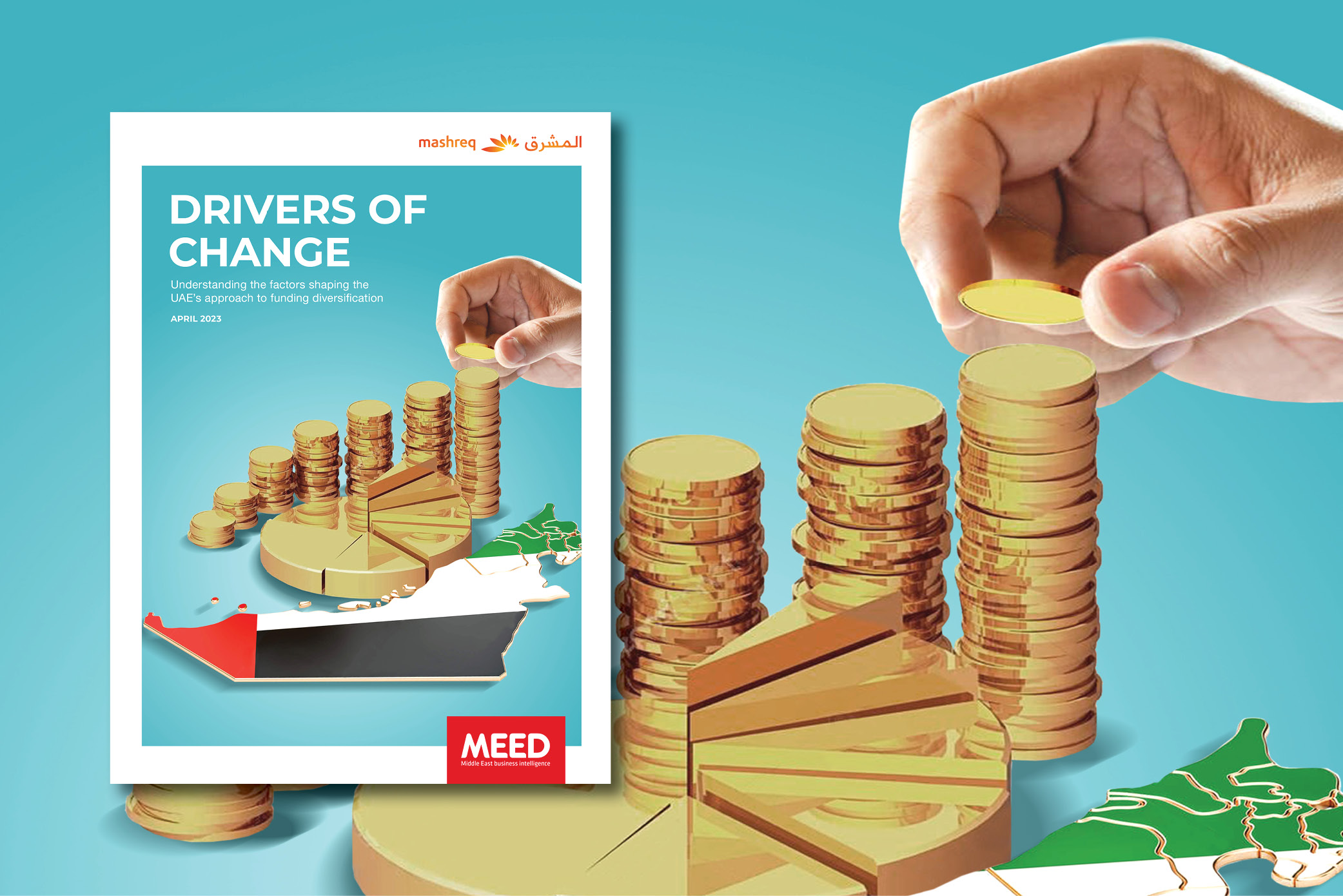Report: Drivers of Change

Download the report
Priorities around sustainability, socio-economic development, Emiratisation and revenue diversification will shape the UAE’s fiscal prudence in the coming year, according to the latest report by MEED in partnership with Mashreq.
Titled ‘Drivers of Change’, the report provides a detailed assessment of the initiatives being taken by the UAE to diversify its economy and explore new revenue-raising strategies.
It also looks at recent strides made with debt and capital markets, and how environmental, social and governance (ESG) principles are increasingly shaping the government’s ability to raise finance.
The UAE has been at the forefront of regional efforts to pursuing economic liberalisation policies, introducing value-added tax (VAT) in 2018, lifting corporate ownership restrictions, and privatising state assets. These reforms have added dynamism to the market and helped ensure the nation remained relatively insulated during the pandemic.
The report provides a detailed analysis of these reforms, assessing their advantages from the perspective of both revenue diversification and expenditure rationalisation.
It also provides a prognosis for the market’s future outlook, highlighting the importance of innovative capital debt market issuance and federal spending, which is playing an increasingly important role in a federation where traditionally individual emirates have followed their own independent fiscal strategies.
Feras Al Jaramani, Head of Public Sector and Energy at Mashreq said: “The UAE government’s significant plan for liberalisation of the fiscal system, including the gradual introduction of tax regimes such as VAT and corporate tax, has greatly enhanced transparency and disclosure, bringing the UAE fiscal regime in line with global markets.
“Furthermore, the comprehensive revamp of the UAE visa rules, industrial growth plans, and startup support system have provided a strong foundation for the economy, helping to take it to new heights in the next 5-10 years. These initiatives demonstrate the UAE leadership’s commitment to fiscal prudence and diversification, and will undoubtedly contribute to the country’s sustained economic growth and development.”
The UAE’s government’s commitment towards the path of economic liberalisation continues to shape 2023 and beyond, with the introduction of corporation tax in mid-2023 providing another income stream. The year will also see the IPO flurry continue in the UAE amid strong investor demand.
Last year saw 12 companies collectively raise over $11bn, including the $6.1bn listing of Dubai Electricity & Water Authority (Dewa), the largest IPO in the GCC.
The momentum continues in 2023, with the $2.5bn listing of Adnoc Gas at the outset of the year, followed by $120m raised by Al Ansari Financial Services and $496m raised by G42’s Presight AI. The UAE’s capital markets are expecting to see 11 listings over 2023.
However, macroeconomic conditions are expected to moderate growth across the board. Across 2023, government entities and sovereign wealth funds will have to brace for external uncertainties in the form of volatile commodity prices, rising inflationary pressures and business disruption caused by factors such as supply chain issues and the Russia-Ukraine war.
Equally crucial to study and implement are policies geared at climate action, and in areas such as food security, water management and circular economy. Fiscal policy is a key navigator in enabling environmental and socially responsible behaviours across value chains. In the run up to Cop28, the global scrutiny on the UAE and its stakeholders are only expected to rise.
As the host, the UAE says it will aim to build consensus and coalitions to achieve a practical, pragmatic and just energy transition and reform land use and food systems, while scaling up adaptation and operationalising the new loss and damage fund.
In line with this, sustainable finance is one of the areas that is expected to rise in relevance, as the UAE seeks to become a regional and global hub for investments underpinned by ESG principles.
Mohab Nematallah, Head of Public Sector, at Mashreq said: “The UAE is demonstrating its commitment to diversifying funding sources through the introduction of taxes, IPOs of key government-related entities, and the development and enhancement of the debt capital market. This is evidenced by the recent issuance of AED federal debt instruments.
Furthermore, the UAE remains steadfast in its commitment to the ESG mandate, promoting green finance and reducing carbon emissions, which aligns with the country’s hosting of Cop28. Sustainable finance is critical in enabling environmentally and socially responsible behaviours throughout value chains, and the UAE is well-positioned to serve as a regional and global hub for investments underpinned by ESG principles.”



